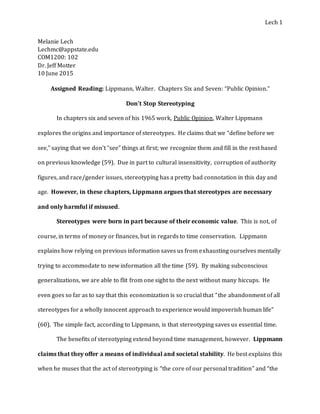
How Stereotyping Can Save Time and Provide Stability
- 1. Lech 1 Melanie Lech Lechmc@appstate.edu COM1200: 102 Dr. Jeff Motter 10 June 2015 Assigned Reading: Lippmann, Walter. Chapters Six and Seven: “Public Opinion.” Don’t Stop Stereotyping In chapters six and seven of his 1965 work, Public Opinion, Walter Lippmann explores the origins and importance of stereotypes. He claims that we “define before we see,” saying that we don’t “see” things at first; we recognize them and fill in the rest based on previous knowledge (59). Due in part to cultural insensitivity, corruption of authority figures, and race/gender issues, stereotyping has a pretty bad connotation in this day and age. However, in these chapters, Lippmann argues that stereotypes are necessary and only harmful if misused. Stereotypes were born in part because of their economic value. This is not, of course, in terms of money or finances, but in regards to time conservation. Lippmann explains how relying on previous information saves us from exhausting ourselves mentally trying to accommodate to new information all the time (59). By making subconscious generalizations, we are able to flit from one sight to the next without many hiccups. He even goes so far as to say that this economization is so crucial that “the abandonment of all stereotypes for a wholly innocent approach to experience would impoverish human life” (60). The simple fact, according to Lippmann, is that stereotyping saves us essential time. The benefits of stereotyping extend beyond time management, however. Lippmann claims that they offer a means of individual and societal stability. He best explains this when he muses that the act of stereotyping is “the core of our personal tradition” and “the
- 2. Lech 2 defenses of our position in society” (63). Making generalizations, according to Lippmann, provides us with a sense of structure and understanding about the way the world works around us. For example, a tribe in the forest may assume that hunters are strong. This “rule” allows current, fit hunters to feel secure in their positions while simultaneously offering the tribespeople something constant. In an unreliable world, constancy and stability give us comfort. Thus, stereotyping shapes our world into something that feels not only more reliable, but more comfortable. It is only when we abuse or remain ignorant about our stereotyping that it becomes dangerous. Lippmann argues that problems arise in “the character of the stereotypes, and the gullibility with which we employ them” (60). To make a generalization is not harmful if one is self-aware of its function as a generalization and its fallibility, as well as their cultural and social biases. When armed with the ability to question ones assumptions, an individual can combat the harmful impacts of negative stereotyping while not foregoing the benefits of making generalizations entirely. It is also important to stay flexible. When presented with contrary evidence, Lippmann discusses two routes of conduct: ignoring it and modifying the stereotype (66). He continues to say that as long as one remains “curious and open-minded,” modification always follows, and thus stereotyping virtually avoids many of the problems it is associated with today (66). One can assume that we are meant to take his findings as a call to change how we stereotype, rather than trying to stop doing it altogether. By the close of chapter seven, Lippmann provides a convincing argument that stereotypes were born of necessity and are not intrinsically harmful.
- 3. Lech 3 Bibliography Lippmann, Walter. Public Opinion. New York: Free, 1965. Print.